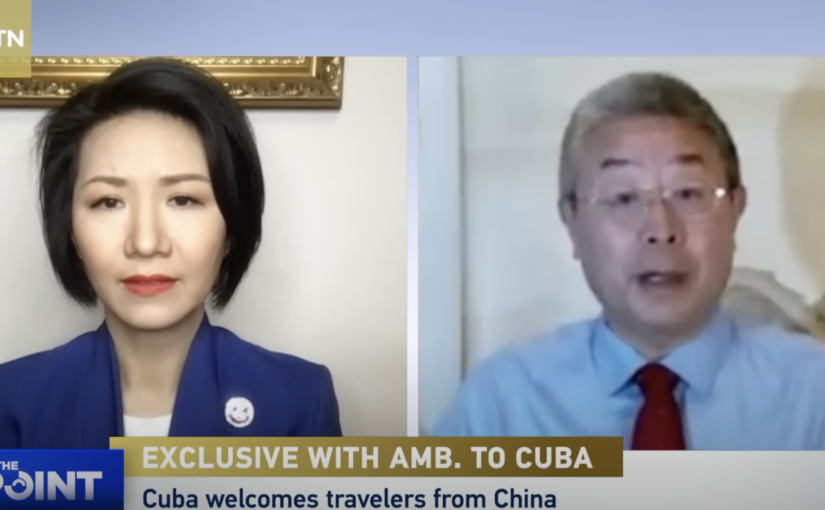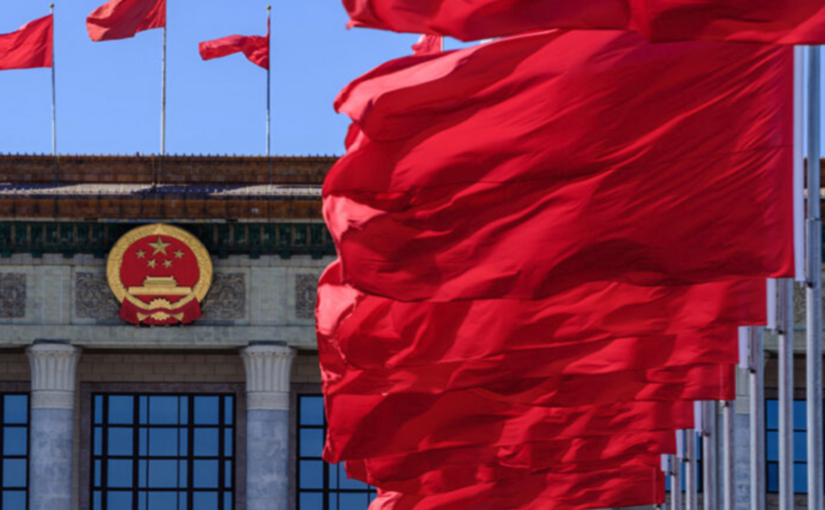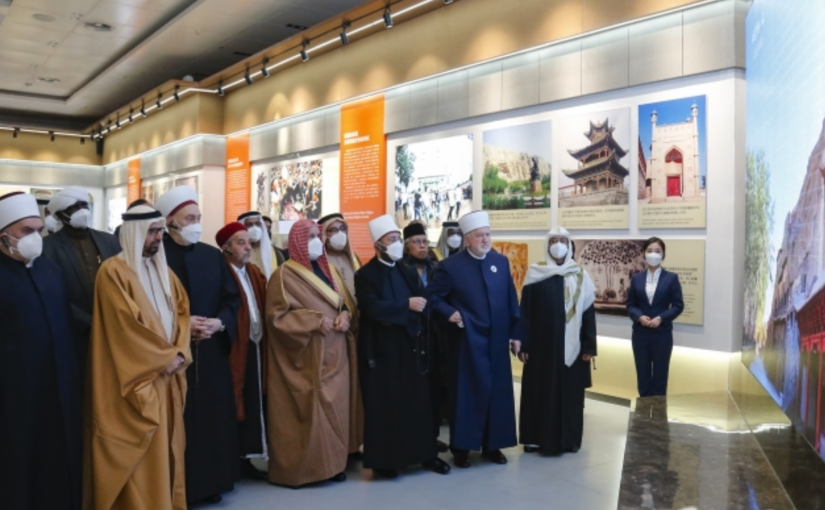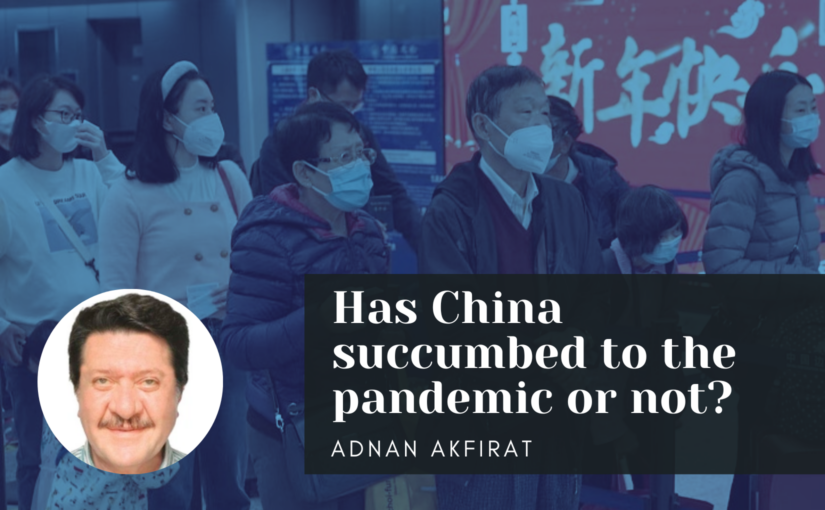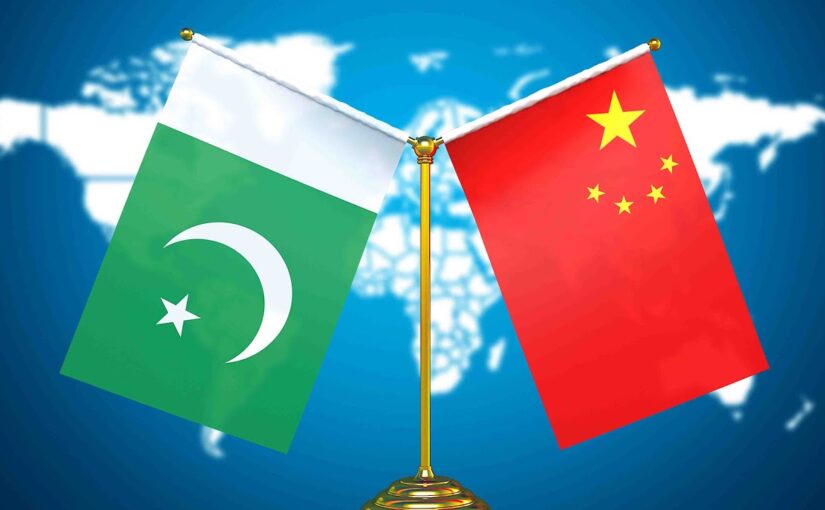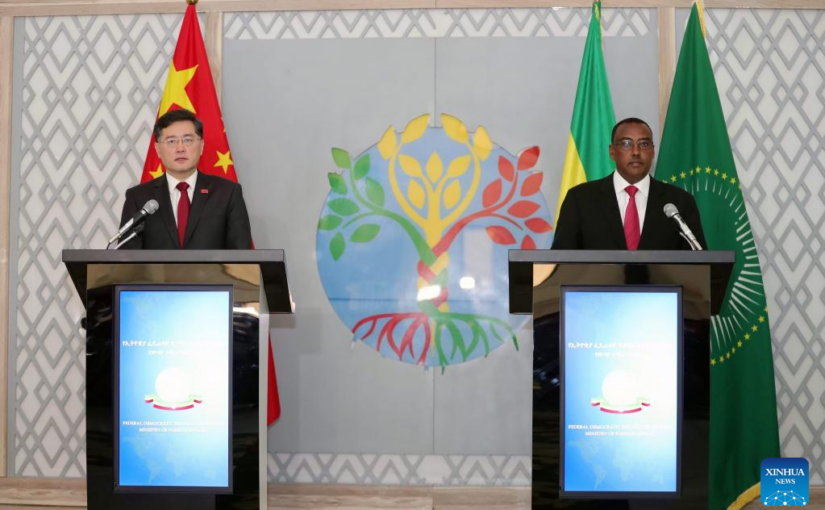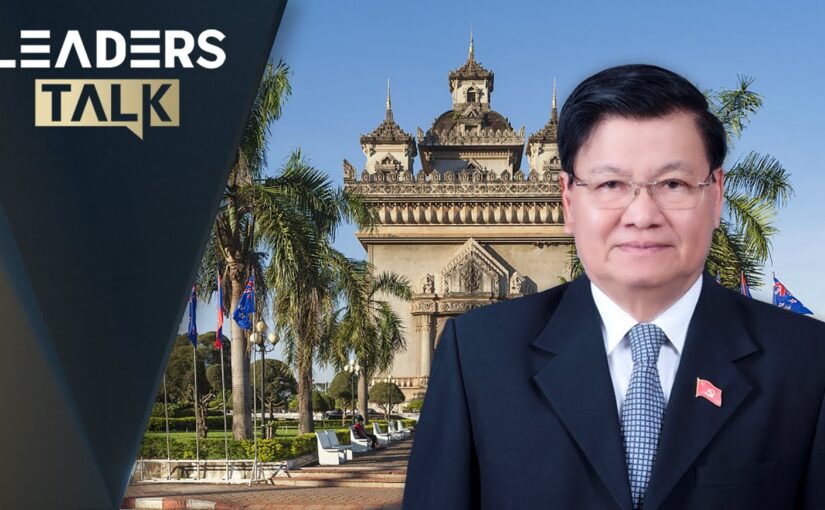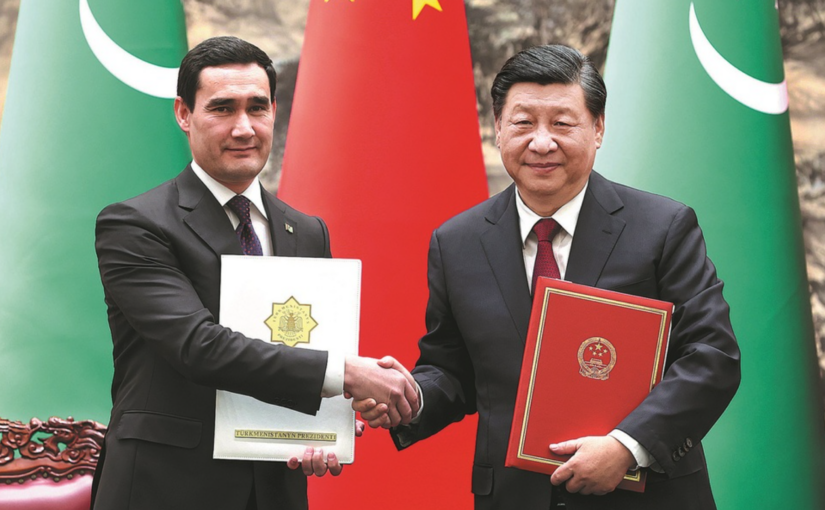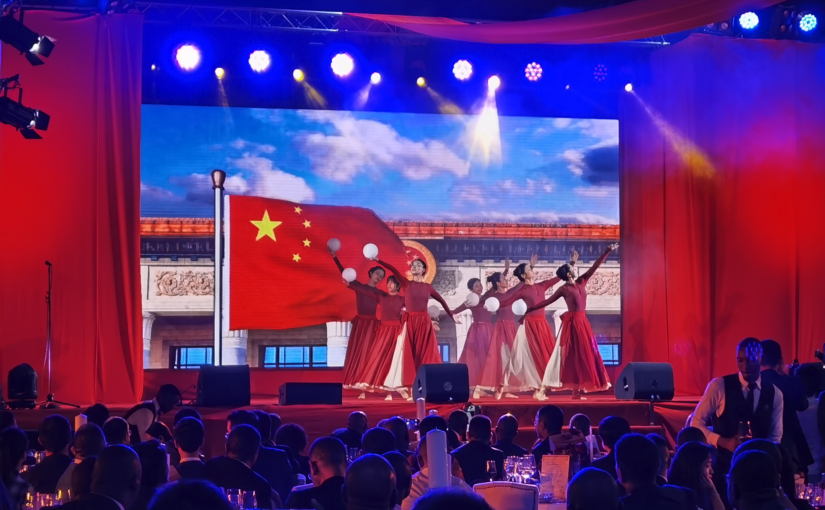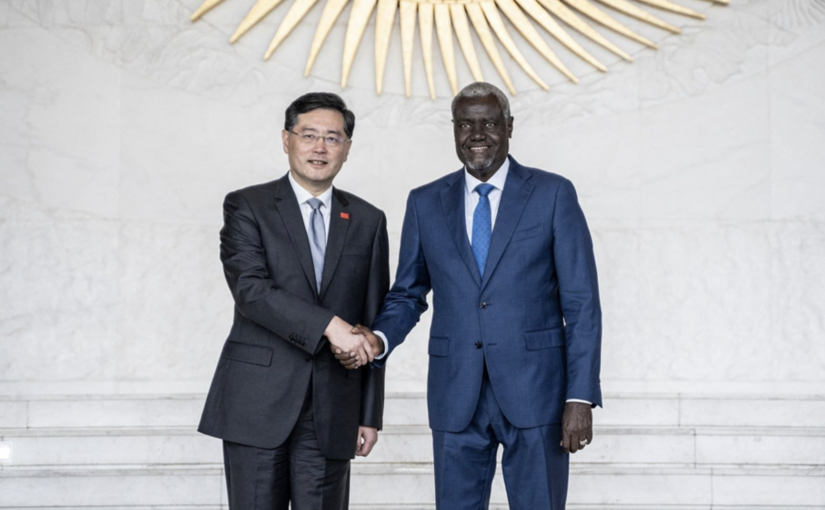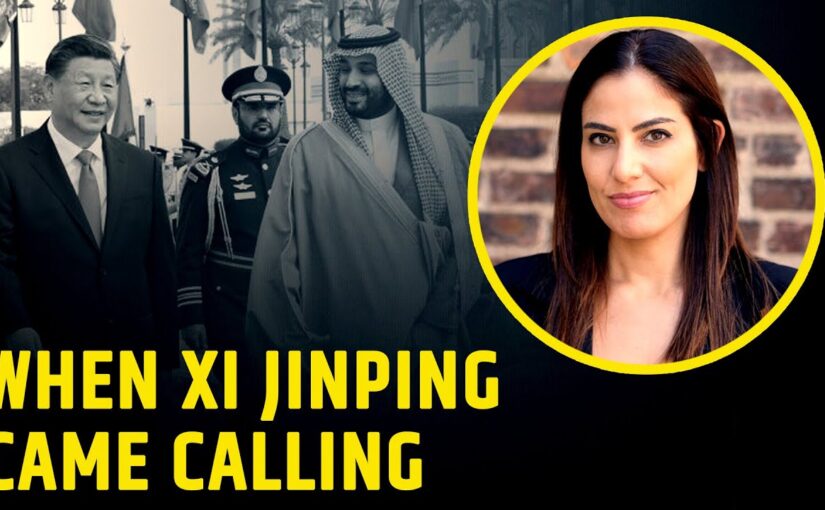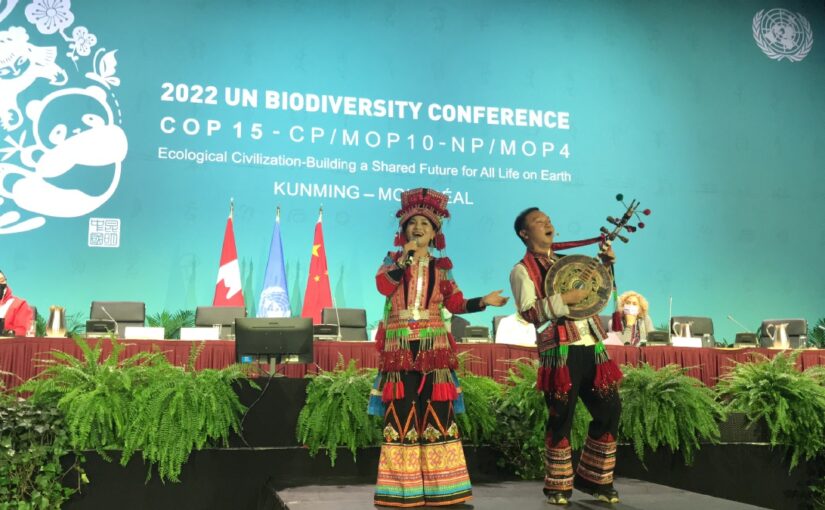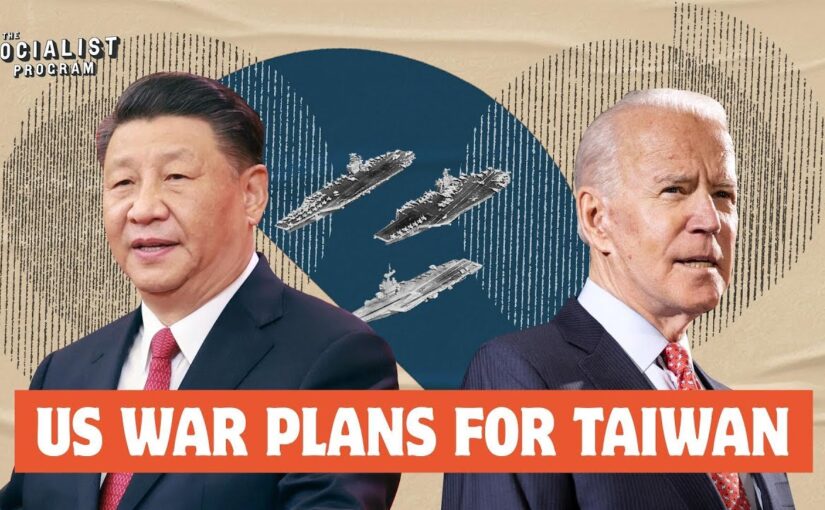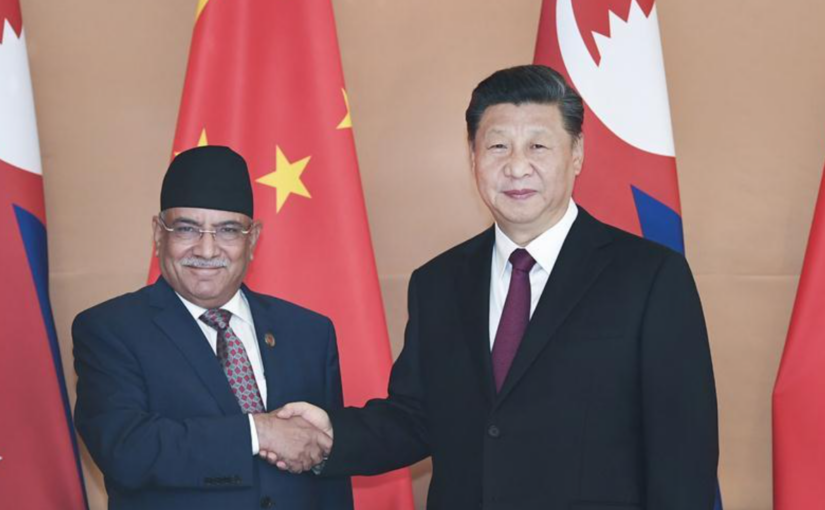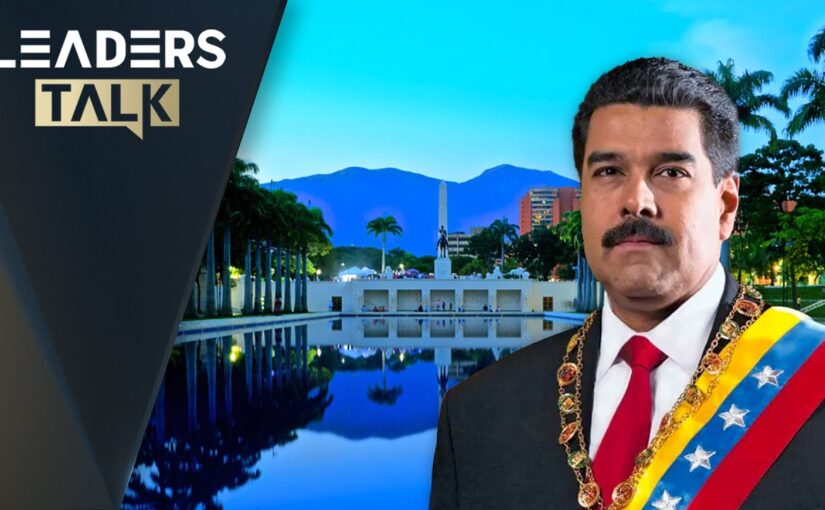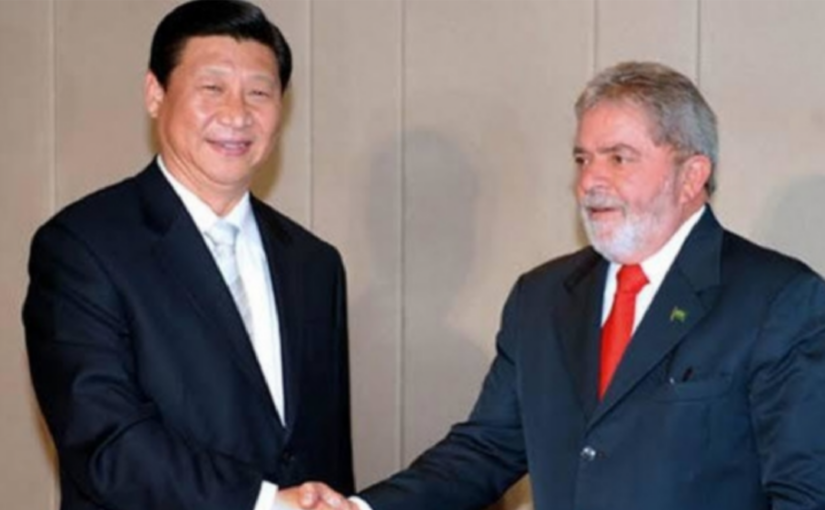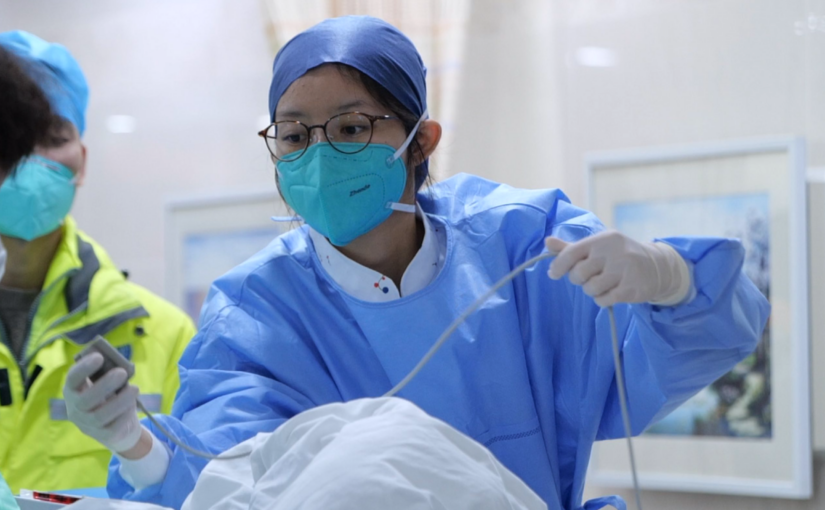In an interview with CGTN’s Liu Xin, China’s Ambassador to Cuba Ma Hui outlines the Caribbean country’s approach to tackling Covid-19 and highlights the cooperation between the two socialist countries. He further criticises the US embargo and contrasts his experience as Ambassador in Havana with that in his previous position as Minister in the Chinese Embassy in London, both in the ‘time of Covid’.
Unlike the discriminatory approach adopted by the US, UK and some other countries, Cuba has welcomed China’s adjustment of its Covid policies and the country stresses that it always welcomes Chinese visitors. Ambassador Ma praises Cuba for managing to contain Covid despite suffering from a decades-long US embargo. Cuba, he notes, has one of the highest rates of administering vaccine boosters, using domestically researched and produced vaccines. There are currently only a few positive Covid test cases per day, with no deaths reported in the last five months. Cuba developed its own vaccines against all the odds – the only Latin American country to do so. The country is quite developed in terms of biotechnology.
China and Cuba always support each other, Ambassador Ma explained, including in fighting the virus. At the onset of Covid-19, Cuba offered material help to China despite its own difficulties and later China reciprocated, supplying ventilators, oxygen generators, medicines and personal protective equipment (PPE) on several occasions.
Cuba’s achievements are all the more impressive in that they have been won whilst fighting under a US embargo that has imposed huge suffering. Indeed, the Cuban people describe the embargo as another lethal virus. Cuba has not only put up a brave fight at home but has also helped others. Both China and Cuba have a tradition of sending medical teams to developing, and even on occasion developed, countries, and through their heroic efforts, the Cuban people sent doctors to some 30 or 40 countries to help them fight the pandemic.
Comparing his Cuban experience to his time in London, Ma Hui said that for the mainstream media and some politicians, China is a victim of “damned if you do, damned if you don’t”. When it came to Covid, the UK failed miserably but lectures others. However, solidarity and cooperation are the only way out as the virus is a common challenge to all humanity.
Liu Xin’s interview with Ma Hui is embedded below.
Author: Friends of Socialist China
Isabel Crook: Founder of New China’s foreign language education
On December 15, 2022, Canadian citizen Isabel Crook, a lifelong communist and one of the most outstanding foreign supporters of China’s revolution and socialist construction, celebrated her 107th birthday.
Born in Chengdu, Sichuan Province, in 1915 to a Canadian missionary family, her extraordinary life has paralleled successive phases of the Chinese revolution, to which she has made a remarkable and indelible contribution.
The article which we reprint below was originally published on the website of the Chinese Foreign Ministry on August 30, 2022, as part of a series entitled ‘100 Stories of the Communist Party of China in International Communication’, and highlights some vignettes of Isabel’s revolutionary life. It notes:
“Isabel’s love for China and the Chinese people was closely linked to the life of a man called David Crook, her husband and comrade… David Crook, a member of the Communist Party of Great Britain, came to China as a teacher under the arrangement of the Communist International. In 1940, Isabel met David in Chengdu and the two fell in love. Two years later, they got married in London and Isabel became a member of the Communist Party under her husband’s influence.”
The Crooks returned to the liberated areas of China in 1947 by arrangement between the British and Chinese communist parties. When they were due to leave in 1948, they were invited to stay to help the newly emerging China in foreign language teaching by Wang Bingnan, who was then in charge of the CPC’s foreign affairs work. The article notes that:
“Isabel was a bit unsure when she began to teach English, as both she and her husband had no professional teaching experience before. The good thing is that they knew a lot about the Chinese revolution. Isabel wanted to see how socialism would be built and learn about Mao Zedong Thought and its practice.”
Capturing the spirit of the times, the article continues: “After the outbreak of the War to Resist US Aggression and Aid Korea in 1950, the army was in urgent need of English language professionals. Under Premier Zhou Enlai’s instruction, a small class of 16 students was opened and the Crooks were in charge of specialized training. They not only gave lessons during the day, but also helped the students with learning difficulties in the evening. What impressed Isabel was that everyone was eager and proud for joining the army. When they learned English well enough, they went to the battlefield.”
Isabel officially retired at the age of 66 in 1981 but did not stop working. “She said she and her husband had always been part of the Chinese revolution and they had a sense of belonging because of the trust the CPC placed in them. They never regret coming to China.”
On September 29, 2019, President Xi Jinping presented Isabel with the Friendship Medal, China’s highest order for foreign citizens.
On 29 September 2019, the presentation ceremony for the National Medals and Honorary Titles of the People’s Republic of China was held at the Great Hall of the People in Beijing. A white-haired senior walked slowly onto the stage and was awarded by President Xi Jinping the Friendship Medal, the highest order of honor of the PRC for foreigners. The laureate was Isabel Crook, one of the founders of New China’s foreign language education. In her more than a century of life, she spent more than 90 years in China, witnessing the Chinese revolution from hardship to victory, and cultivated a large number of foreign language students for New China.
In 1915, Isabel was born to a Canadian missionary family in Chengdu, Sichuan Province. After graduating from the University of Toronto with a master’s degree in 1938, 23-year-old Isabel couldn’t wait to return to Sichuan. Back then, the “hometown” where she was born and raised was battered by war. Determined like a fearless woman warrior, she nevertheless decided to settle down there and devote herself to anthropological studies.
Continue reading Isabel Crook: Founder of New China’s foreign language educationWebinar: Give peace a chance – China and the world today (22 January)
On Sunday 22 January (at 11am EST, 8am PST, 4pm GMT), the CPUSA Education Commission is organizing a webinar on the theme Give peace a chance – China and the world today. There will be a presentation by Friends of Socialist China co-editor Carlos Martinez, followed by discussion and Q&A.
Demonizing China’s Covid policies is fearmongering
In this insightful article for Global Times, Friends of Socialist China advisory group member Ken Hammond provides an overview of China’s evolving strategy for dealing with the Covid-19 pandemic – a strategy that has saved literally millions of lives to date.
Ken also discusses the extraordinary hypocrisy of the Western media’s portrayal of this strategy. For almost three years of Dynamic Zero Covid, “terms like ‘draconian’ were constantly used to criticize China’s measures to control and contain the virus”. Now restrictions have been loosened and “China is denounced for recklessly endangering its people and the rest of the world” – in spite of the fact that “governments in America and Europe have effectively abandoned any efforts to deal with the pandemic over the past year.”
The author makes the important point that this hypocritical reporting is part of a broader campaign of demonization – a reflection of rising anger among the US ruling class as all hopes fade away that China might be subjected to a ‘color revolution’ and become “a compliant, subordinate component of the American-dominated global capitalist order.” Ken opines that the relentless China-bashing is the product of a social class that has come to fear “the loss of the power and privileges they have so long enjoyed based on the extraction of wealth from working people around the planet.”
This demonization campaign creates a dangerous situation, fomenting conflict and standing in the way of the development of cooperation and understanding. People who support peace and progress should firmly oppose the propaganda war on China.
China’s COVID policies have saved millions of lives over the past three years. Yet those policies were attacked by some Western politicians, media pundits, and academics every day. Terms like “draconian” were constantly used to criticize China’s measures to control and contain the virus. China’s achievements in managing the epidemic were unmatched anywhere in the world, yet an ordinary citizen of a Western country can have very little idea of that given the relentless demonization of China to which they are regularly exposed.
Now, in the context of new scientific understandings of the latest variants of the virus, and in an effort to balance the ongoing need to protect the lives of the Chinese people with the goal of carrying forward the development of their economy, a new set of policies and practices is being implemented, relaxing many of the restrictions and controls which have been used over the last three years. One might expect that this would be welcomed in the West, yet quite the opposite has been the case.
China is now denounced for recklessly endangering its people and the rest of the world, even as governments in America and Europe have effectively abandoned any efforts to deal with the pandemic over the past year. Well over 1.1 million people have died in the US. The same media voices, like the New York Times, Washington Post, Wall Street Journal, or The Guardian, which railed against China’s so-called “oppressive” COVID policies, now spout a steady stream of condemnation of China’s efforts to pursue a more flexible, adaptive COVID policy package.
Continue reading Demonizing China’s Covid policies is fearmongeringIslamic scholars impressed by development and religious freedom in Xinjiang
The following Global Times article is based on an interview with Emirati scholar Ali Rashid Al Nuaimi, chairman of the World Muslim Communities Council, following a recent delegation he led of more than 30 Islamic figures and scholars from 14 countries to Xinjiang Province.
Outlining the motivation for the visit, Al Nuaimi points out that there is gross misrepresentation of Xinjiang – and of the situation of Muslims in China generally – in the mainstream media. “I thought it’s very important for the Muslim world to understand what is happening in the Xinjiang region, as seeing is believing.”
Al Nuaimi stated that Muslims in China enjoy freedom of religion, and noted that a Muslim and Chinese identity coexist comfortably. He also spoke highly of the constantly improving standard of living in Xinjiang.
Countering the narrative of Chinese “concentration camps”, Al Nuaimi talks about his visits to technical colleges on this trip and on a previous trip in 2019. He speaks favorably of these colleges, saying they play an essential role teaching training and preparation for the job market. “I am an academician. I visited most of the universities in North America and Europe and their colleges and technical centers. They don’t have this for their youth. I wish that what we have seen today was available in all countries.”
He concludes by urging the people of Xinjiang to ignore the slanders hurled by Western politicians and journalists. “They criticize China because they want to slow or undermine your achievements and your development.”
Led by Ali Rashid Al Nuaimi, chairman of The World Muslim Communities Council from the UAE, a delegation including more than 30 Islamic figures and scholars from 14 countries visited Northwest China’s Xinjiang region starting on January 8. They went to mosques, the Xinjiang Islamic Institute, bazaars and many other places to communicate with local residents and religious groups in Urumqi, Altay and Kashi and to get a better understanding of the region’s development and protection of religious freedom.
On the last day of their visit in Kashi, Al Nuaimi was interviewed by Global Times reporters Liu Xin and Fan Lingzhi (GT). He shared his views on the current situation in Xinjiang and the smearing campaign led by a small group of countries to attack China on Xinjiang-related issues.
GT: We’ve noticed that this is not your first visit to Xinjiang. Are there any specific reasons for you to make this trip?
Al Nuaimi: When I visited this region in 2019, I was with a small delegation from the UAE only. I thought it’s very important for the Muslim world to understand what is happening in the Xinjiang region, as seeing is believing. This is why I invited many colleagues from different countries to come and join the visit. I can see the difference and the development that’s happening here.
Yesterday we visited the old town in Kashi. We saw the market, we saw the people on the street, we engaged with them. We saw how people are enjoying a lifestyle, enjoying the development and you can see their happiness and their smiles.
Continue reading Islamic scholars impressed by development and religious freedom in XinjiangHas China succumbed to the pandemic or not?
We are pleased to publish below the English version of an article by Adnan Akfirat, Chairman of the Turkish Chinese Business Development and Friendship Association (and member of the Friends of Socialist China advisory group), countering Western propaganda about China’s evolving strategy against the Covid-19 pandemic.
Having lived through 63 days of quarantine in Shanghai in 2022, and then contracted Covid for the first time upon travelling to Türkiye, the author has witnessed at close quarters the accomplishments of China’s Dynamic Zero Covid policy, which saved many millions of lives while China bought time to develop and deploy vaccines and treatments, and to bolster its healthcare system. He notes that China’s extraordinary mobilization of resources for the protection of human life against Covid is testament to the superiority of the socialist system.
Adnan further observes that there has been a positive side-effect of the Covid-19 pandemic in China, in that it has accelerated the improvement of the public healthcare system and stimulated a return to the development of comprehensive, state-funded, high-quality healthcare for all.
The article was originally published in Aydınlık and has been translated into English for us by the author. A shorter version has also appeared in Global Times.
The People’s Republic of China’s policies against the Covid-19 pandemic have been a major concern for US governments. The strict controls and quarantines required by China’s Dynamic Zero Covid policy were denounced as human rights violations. Towards the end of 2022, China determined that the virus was no longer so lethal and adopted a strategy of loosening restrictions. This time, the Atlantic camp accused China of “endangering humanity” and began to impose restrictions on Chinese tourists.
In his New Year’s speech at the start of 2023, President Xi Jinping emphasized that “since the COVID 19 pandemic, we have always put people and life first.” Xi said China has entered a new phase in its fight against the epidemic and “we have adapted our COVID 19 response in light of the evolving situation to protect the lives and health of the people to the greatest extent possible.”
For the last two months, US and European leaders and Western media have been accusing China of spreading disease and making the Chinese people miserable. Unfortunately, the Turkish media has also joined this campaign without questioning it. If you look at Turkish newspapers and TV channels, especially on social media, you will see that “China is collapsing from the disease!”
Continue reading Has China succumbed to the pandemic or not?China-Pakistan friendship “higher than mountains and deeper than oceans”
The special and invariable relationship between China and Pakistan was underlined and reinforced in phone calls between leaders of the two countries in early January.
On January 5, Premier Li Keqiang spoke with his Pakistani counterpart, Prime Minister Shahbaz Sharif. Li Keqiang said that the China-Pakistan friendship has stood the test of international vicissitudes and grown from strength to strength. China always sees China-Pakistan relations as a priority in its neighborhood diplomacy, and will continue to support Pakistan in safeguarding national independence, sovereignty, territorial integrity and legitimate rights and interests, upholding domestic solidarity and stability and realizing national development and rejuvenation.
On his part, Shahbaz thanked China for providing tremendous support and assistance for Pakistan in the fight against floods, and highly appreciated China for always standing together with Pakistan when it encounters difficulties. He noted that this has fully demonstrated the “ironclad” friendship between Pakistan and China that is higher than mountains and deeper than oceans.
This was followed on January 9 by a phone call between newly appointed Chinese Foreign Minister Qin Gang and his Pakistani counterpart Bilawal Bhutto Zardari.
Qin Gang said that China and Pakistan enjoy special friendship and high-level mutual trust. Bilawal once again congratulated Qin Gang on his assuming office as China’s Foreign Minister, saying that the ironclad brotherhood between China and Pakistan is the “North Star” guiding Pakistan’s foreign policy toward China.
The following reports were originally published on the website of the Chinese Foreign Ministry.
Li Keqiang Speaks with Pakistani Prime Minister Shahbaz Sharif on the Phone
Ministry of Foreign Affairs, 5 January 2023
On the afternoon of January 5, 2023, Premier Li Keqiang of the State Council had a phone call at request with Pakistani Prime Minister Shahbaz Sharif at Ziguangge of Zhongnanhai.
The Premier and the Prime Minister first exchanged New Year greetings. Li Keqiang said that the China-Pakistan friendship has stood the test of international vicissitudes and grown from strength to strength. China always sees China-Pakistan relations as a priority in its neighborhood diplomacy, and will continue to support Pakistan in safeguarding national independence, sovereignty, territorial integrity and legitimate rights and interests, upholding domestic solidarity and stability and realizing national development and rejuvenation. Mr. Prime Minister’s successful visit to China not long ago has given a strong boost to the development of bilateral relations. China is ready to have close high-level exchanges with Pakistan, advance practical cooperation in key fields, and work towards the greater development of China-Pakistan relations.
Continue reading China-Pakistan friendship “higher than mountains and deeper than oceans”China supports peace, unity and development in Ethiopia
During his recent visit to Ethiopia, the first leg of his ongoing Africa tour, Chinese Foreign Minister Qin Gang addressed the current peace process in the East African country in a press conference he gave together with Ethiopian Deputy Prime Minister and Foreign Minister Demeke Mekonnen.
Asked for his views on the recent peace agreement, signed on November 2, 2022 in South Africa, Qin Gang noted that that Ethiopia is the common home of all Ethiopian people, including those from Tigray.
Ethiopia has now entered a new stage of looking forward to peace and focusing on development after the recent signing of a ceasefire agreement between the federal government of Ethiopia and the Tigray People’s Liberation Front (TPLF), which has been gradually implemented, he said.
China is sincerely glad to see this and extends warm congratulations to the government and people of Ethiopia, Qin added.
He said China has always taken the view that the conflict in Tigray is an internal affair of Ethiopia and that the Ethiopian people have the wisdom and ability to independently resolve their internal differences.
The TPLF was the principal component of the now defunct Ethiopian People’s Revolutionary Democratic Front (EPRDF), which was the ruling party in Ethiopia until 2019.
Qin Gang also responded to questions on the “Outlook on Peace and Development in the Horn of Africa”, proposed by China.
The following article was originally published by the Xinhua News Agency.
Chinese Foreign Minister Qin Gang on Tuesday addressed members of the press along with Ethiopian Deputy Prime Minister and Foreign Minister Demeke Mekonnen, after their talks in Addis Ababa.
When asked about China’s views on the peace agreement in Ethiopia and the progress of the China-proposed “Outlook on Peace and Development in the Horn of Africa” in Ethiopia, Qin said that Ethiopia is the common home of all Ethiopian people, including those from Tigray.
Ethiopia has now entered a new stage of looking forward to peace and focusing on development after the recent signing of a ceasefire agreement between the federal government of Ethiopia and the Tigray People’s Liberation Front (TPLF), which has been gradually implemented, he said.
Continue reading China supports peace, unity and development in EthiopiaVideo: Lao president speaks about close bonds with China
In this episode of the new CGTN series Leaders Talk, Zou Yun interviews Thongloun Sisoulith, President of Laos and Secretary-General of the Lao People’s Revolutionary Party.
Describing the inauguration of the Laos-China High-Speed Railway as the dream of the Lao people come true, President Thongloun refers to the long history of brotherly connections between the two countries and peoples, specifically to their helping each other in the fight against foreign aggressors. During the Lao people’s war of liberation, the communist party, army and people of China rendered timely, effective and unconditional support to their Lao comrades, and this friendship, comradeship and brotherhood has continued in the new phase of nation building.
Thongloun recalls his own first visit to China in 1970, when he was a young man in his 20s, working in the Hanoi office of the Lao Patriotic Front. At that time he was escorting 500 students who were to study at the China-Laos Friendship School, which had been established in the city of Nanning in 1967. With Laos facing a brutal US war of aggression, “we sent our kids to China for the Chinese comrades to take care of them.”
Over many subsequent visits to China, Thongloun notes that the Chinese economy has boomed, the country has remained stable, and China has become a pillar of world peace and stability.
He speaks at some length about his impressions of, and personal relationship with, President Xi Jinping, which is clearly characterised by a deep friendship and comradeship. He also talks about the cultural similarities between Laos and China. Noting that China has “many good old revolutionary songs”, he says that he “loves them very much.”
Zou Yun also takes a ride on the high-speed train to get the impressions of some passengers.
The full interview is embedded below.
China hosts state visits from the Philippines and Turkmenistan
China’s diplomatic year began in the first week of January with President Xi Jinping hosting state visits by President Ferdinand Romualdez Marcos Jr. of the Philippines from January 3-5 followed by that of President Serdar Berdimuhamedov of Turkmenistan from January 5-6. China’s hosting in this way of two leaders from neighbouring countries, in South East Asia and Central Asia respectively, reflects the strong and increasing emphasis given in its foreign policy to relations with fellow Asian countries, neighboring countries in particular.
Marcos was not only the first foreign leader hosted by China in 2023 – this was also his first visit to China since he assumed his country’s presidency on June 30 2022 and his first official visit to a country outside the Association of South East Asian Nations (ASEAN). However, he is certainly no stranger to the country. In 1974, at the age of 17, he accompanied his mother, Imelda Marcos to a meeting in Beijing with the late Chairman Mao Zedong, one year before his father, the late President Ferdinand E. Marcos established diplomatic relations with the People’s Republic.
His visit this time was a major success, resulting in the adoption of an extensive Joint Statement between the two countries along with 14 cooperation documents across a wide range of sectors. In particular, both sides agreed to continue to properly handle maritime issues through friendly consultation and resume negotiations on oil and gas exploration.
According to their joint statement: “The two leaders had an in-depth and candid exchange of views on the situation in the South China Sea, emphasized that maritime issues do not comprise the sum-total of relations between the two countries and agreed to appropriately manage differences through peaceful means. Both sides reaffirmed the importance of maintaining and promoting peace and stability in the region and the freedom of navigation in and overflight above the South China Sea, and reached consensus on the peaceful resolution of disputes on the basis of the Declaration on the Conduct of Parties in the South China Sea (DOC), the United Nations Charter and the 1982 United Nations Convention on the Law of the Sea (UNCLOS).”
For his part, President Xi, “expressed readiness to stay in regular strategic communication with President Marcos Jr. and make comprehensive plans for the growth of bilateral ties so that the two countries will stay good neighbors helping each other, good relatives sharing affinity, and good partners pursuing win-win cooperation, delivering more benefits to the two peoples and contributing more positive energy to peace and stability in the region.”
All of this constitutes a significant blow to the efforts of the United States, which has worked overtime to create and exacerbate discord between the Philippines and China over the maritime and other issues with a view to maintaining its own neo-colonial domination over the Philippines alongside its strategic position in the region.
Hosting his Turkmen counterpart, Xi Jinping highlighted the similar values, goals and converging interests shared by the two nations, saying that they should work together in their respective paths toward rejuvenation, enhance their strengths, explore further potential for cooperation and attain common growth. It was the two leaders’ second meeting in a few months, having met in September on the sidelines of the Shanghai Cooperation Organization (SCO) Summit held in the Uzbek city of Samarkand.
At their meeting this time, they announced that their two countries were elevating their bilateral ties to those of a comprehensive strategic partnership. Turkmenistan is a major producer of natural gas and President Xi noted that cooperation in this sector is the cornerstone of their bilateral relations, with the two countries needing to further explore the potential for cooperation in green energy, natural gas exploitation and technological equipment, and work toward cooperation covering whole industry chains.
Turkmenistan is a key supplier of natural gas to China, with the two nations having developed three gas pipelines in a project known as the China-Central Asia Gas Pipeline. The project supplies natural gas to over 500 million residents in 27 provincial-level regions and the Hong Kong Special Administrative Region, according to Xinhua News Agency.
Berdimuhamedov told a ceremony in June that the construction of a fourth line of the China-Central Asia Gas Pipeline will take the annual transmission capacity to China to 65 billion cubic meters. The current pipeline delivered over 40 billion cubic meters of natural gas in the January-November period last year, according to its operator.
During their meeting, Xi said the cooperation mechanism between China and the five Central Asian countries is open, transparent, mutually beneficial, equal and pragmatic. China stands ready to work with Turkmenistan to ensure the success of the first summit between China and the five nations, he said.
Xi said China supports constructive cooperation between Turkmenistan and the Shanghai Cooperation Organization, and is willing to make joint efforts in practicing true multilateralism. Since its emergence as an independent state, following the dissolution of the Soviet Union, Turkmenistan has firmly upheld its independence and practices strict neutrality. It presently attends SCO meetings in the capacity of an official guest. Coinciding with his visit, President Berdimuhamedov contributed an article to the Decision Makers platform of CGTN, where he wrote that:
“Turkmenistan closely monitors the development of China and is pleased with the nation’s achievements. In a very short period of its history, China has emerged as a world pioneer in economic and scientific development, with robust growth in industrial output and the completion of many large-scale social development programs. China has managed to pull off an outstanding achievement ‒ the eradication of absolute poverty. Today, China is taking confident steps towards building a modern socialist country in an all-round way. There is no doubt that the above brilliant achievements are made possible by the political will, strong determination and correct strategic policies of the Communist Party of China, as well as the understanding and support of the Chinese people.”
The following articles were originally published by the Xinhua News Agency, China Daily and CGTN.
China, Philippines cement ties in new year
Xinhua, 5 January 2023
Chinese President Xi Jinping held talks with Philippine President Ferdinand Romualdez Marcos Jr. at the Great Hall of the People during the latter’s state visit to China on Wednesday.
Marcos is the first foreign leader hosted by China in 2023. This visit is his first visit to China as president and his first official visit to a country outside the Association of Southeast Asian Nations (ASEAN).
“This speaks volumes about the close ties between China and the Philippines and the important place that the two countries take in each other’s foreign policies,” Xi told Marcos.
A journey to retrace history and plan for the future
China and the Philippines are close neighbors facing each other across the sea. In their exchanges over a millennium, good faith and mutual assistance have remained the defining feature of bilateral relations and a precious legacy cherished by the two peoples, Xi said.
Continue reading China hosts state visits from the Philippines and TurkmenistanChina and Angola celebrate 40 years of diplomatic relations
China and Angola celebrated the 40th anniversary of their establishing diplomatic relations on January 12, with an exchange of messages between President Xi Jinping and his Angolan counterpart João Lourenço.
Xi pointed out in his message that since the establishment of diplomatic ties, China and Angola have always been sincere and friendly towards each other, worked hand in hand, and understood and supported each other on issues involving their respective core interests and major concerns.
For his part, Lourenço noted that the two countries agree with each other on many international issues. He said Angola is willing to strengthen friendly and cooperative relations with China, build a shared win-win future, as well as achieve common progress, prosperity and development, so as to bring more benefits to the people of the two countries.
Meanwhile, some 600 people attended a reception marking the occasion on the evening of July 11, held by the Chinese Embassy in the Angolan capital Luanda. Chinese Ambassador to Angola Gong Tao said in his address that China and Angola have always adhered to solidarity and mutual assistance, achieving fruitful cooperation and exchanges in various areas during the past 40 years.
For many years, China has been Angola’s biggest trading partner, biggest export market, and significant source of investment. In turn, Angola has become China’s second-largest trading partner and the largest supplier of crude oil in Africa.
Underlining these excellent relations, Chinese Foreign Minister Qin Gang, presently on a tour of Africa, will visit Angola shortly.
The following articles were first published by the Xinhua News Agency.
Xi, Angolan president exchange congratulations on 40th anniversary of diplomatic ties
Xinhua, 12 January 2023
Chinese President Xi Jinping on Thursday exchanged congratulations with Angolan President Joao Lourenco on the 40th anniversary of diplomatic relations between the two countries.
Xi pointed out in his message that since the establishment of diplomatic ties 40 years ago, China and Angola have always been sincere and friendly towards each other, worked hand in hand, and understood and supported each other on issues involving their respective core interests and major concerns.
At present, China-Angola relations enjoy a sound development momentum, and bilateral cooperation in various fields has yielded fruitful results, bringing tangible benefits to the people of the two countries, Xi noted.
Continue reading China and Angola celebrate 40 years of diplomatic relationsQin Gang: May China-Africa friendship last forever
Following his appointment as China’s Foreign Minister at the end of December, Qin Gang, who was previously China’s Ambassador to the United States, left Beijing on January 9 to continue a 33-year-old tradition in Chinese diplomacy, whereby the country’s Foreign Minister starts the new year by visiting a number of countries in Africa.
Making a brief stopover in Bangladesh, where he met his counterpart Abdul Momem, in the early hours of January 10, Qin Gang’s first visit was to Ethiopia. He will continue to Gabon, Angola, Benin, and Egypt, returning home on January 16. His tour also includes visits to the headquarters of the African Union (AU), which is based in Ethiopia, and of the League of Arab States, which is based in Egypt. President Xi Jinping attended the China/Arab League Summit, which was held in Saudi Arabia, last month.
On January 11, Qin Gang held the eighth China-AU Strategic Dialogue, together with the AU Commission Chairman Moussa Faki Mahamat, at the AU headquarters in the Ethiopian capital Addis Ababa.
He noted that China had taken the lead in supporting the AU’s membership in the G20 and in enhancing Africa’s representation and voice in the UN Security Council, while Faki said that China stands with Africa in its struggle for national independence and liberation; it stands with Africa in its efforts to accelerate development and revitalization and to participate more in international affairs.
Following their talks, Qin and Faki attended the completion ceremony for the China-aided project of the Africa Center for Disease Control and Prevention (CDC) headquarters. Addressing the ceremony, Qin put forward a four-point proposal on developing China-Africa relations. In it he expressed China’s support for South Africa in its rotating BRICS presidency and for Uganda in hosting the Summit of the Heads of State and Government of the Non-Aligned Movement.
China makes no empty promises, still less presses others against their own will, Qin said, adding that when the Africa CDC headquarters is handed over to China’s African friends, it will be wholly run and managed by the AU without any interference from China.
The following articles were originally carried by CGTN and the Chinese Foreign Ministry.
China, AU vow to build a China-Africa community with a shared future in new era
China is ready to continue to work with Africa as a development partner and build a China-Africa community with a shared future in the new era, Chinese Foreign Minister Qin Gang said on Wednesday during a meeting with African Union (AU) Commission Chairman Moussa Faki Mahamat.
Qin and Faki held the eighth China-AU Strategic Dialogue at the AU headquarters in Addis Ababa, the capital of Ethiopia on Wednesday.
China has taken the lead in supporting the AU’s membership in the G20, enhancing the representation and voice of African countries in the UN Security Council and other international organizations, and safeguarding the common interests of the vast number of developing countries, Qin said.
He added that China is willing to continue to play a constructive role in maintaining peace and security in Africa.
Continue reading Qin Gang: May China-Africa friendship last foreverVideo: Xi Jinping’s visit to the Gulf and changing geo-political realities
In this interview with People’s Dispatch, Rania Khalek assesses the significance and results of Xi Jinping’s December 2022 visit to Saudi Arabia and his meetings with the leaders of the region. Rania observes that, while US-Saudi relations have been on a downturn in recent years, China has been steadily strengthening its ties with the countries of the Middle East. The Riyadh Declaration of the First China-Arab States Summit, conducted on 10 December, announced that China and the Arab States would work collectively to build a China-Arab community with a shared future – one component of which may very well include the emergence of China’s yuan in global energy markets.
Rania notes that the rise of China is helping to create an alternative foreign policy path for Saudi Arabia, which for decades has tended to act as a proxy for US imperialism in the region. Such a development is profoundly consequential, since China has a strong and consistent interest in promoting peace and stability in the region, and operates on the basis of peaceful coexistence, mutual respect and non-interference. Rania points out that the Riyadh Declaration affirmed the illegality of Israeli settlements in the Palestinian territories and condemned Israel’s unilateral attempts to change the status quo in Jerusalem. The spirit of this text is profoundly different to what would have been written in Washington, and bodes well for the struggle of the Palestinian people to restore their national rights. Indeed, Xi stated in his keynote speech at China-Arab States Summit: “The historical injustices done to the Palestinian people should not be left unattended indefinitely. The legitimate rights of a nation are not up for trade, and the demand for an independent state shan’t be denied. China firmly supports the establishment of a State of Palestine.”
Summit links biodiversity with culture
The following article, published in China Daily, summarizes the proceedings of a Nature and Culture summit held during the 15th meeting of the United Nations’ Conference of the Parties (COP15) to the Convention on Biological Diversity, held in Montreal on 11-12 December 2022. The article is particularly interesting for the points it makes regarding the role of minority groups in protecting the environment and promoting a harmonious coexistence between humanity and nature.
Huang Runqiu, China’s Minister of Ecology and Environment, and the president of COP15, “stressed the importance of cultural diversity, especially the experience and knowledge from minority groups.” Huang also highlighted the importance of fully respecting and protecting traditional cultures around the world, appreciating and making use of their understanding of biodiversity protection and encouraging the transmission of this understanding from generation to generation.
The article contrasts this approach with the colonial powers’ record of land grabs, intellectual property restrictions and profiteering. Indigenous Canadian activist and academic Priscilla Settee, professor emeritus at the University of Saskatchewan, told the meeting that “we need to get our history right. We need to acknowledge the centuries of colonialism … based in global imperialism through land grabs. We need to take a critical look at international free trade agreements that I call bills of rights for the rich and powerful.”
A global dialogue on strengthening the links between nature and cultures to achieve a sustainable and ecological civilization also highlighted the achievements and actions taken by China.
Officials, experts and nongovernmental organization (NGO) members gathered at a Nature and Culture summit during the 15th meeting of the United Nations’ Conference of the Parties (COP15) to the Convention on Biological Diversity (CBD) Dec 11-12, in support of the implementation of the post-2020 Global Biodiversity Framework (GBF).
In his opening remarks, Huang Runqiu, the Chinese minister of ecology and environment and the president of COP15, stressed the importance of cultural diversity, especially the experience and knowledge from minority groups.
The relationship between nature and culture is vibrant, said Huang. Culture is deeply intertwined with the natural world. Chinese culture contains a clear concept of harmonious coexistence between humanity and nature, he said.
For example, Yunnan province, where the first phase of the COP15 meeting was held, is home to 26 traditional ethnic groups and 15 unique minority groups, forming a series of traditional ecological cultures such as the Hani Terrace Culture, Naxi Dongba Culture, Dai Long Mountain Culture, and Tibetan Holy Land Culture.
Their worldviews, cultural values and identities are closely connected to nature, as per their saying, “Humans and nature are half-brothers”.
Continue reading Summit links biodiversity with cultureVideo: How the US’s Taiwan policy makes war with China a self-fulfilling prophecy
In this important episode of The Socialist Program on BreakThrough News, Brian Becker and Ken Hammond conduct a detailed discussion about the US strategy of fomenting tensions across the Taiwan Strait. Taking as their starting point a recent article in the Wall Street Journal entitled ‘To Deter China, Taiwan Must Prepare for War’, Brian and Ken describe how the US is deliberately and determinedly creating instability in the region, encouraging Taiwanese separatism and undermining the One China Principle in order to create a potential war scenario that will slow down China’s rise and undermine popular support for the CPC-led government. The geopolitical context, of course, is that of a global New Cold War in which US imperialism is hitting out in all directions in order to perpetuate American global dominance and reverse its process of decline.
Brian and Ken note that China’s position in relation to Taiwan has not changed in the course of many decades: China is very clear that the Taiwan question is an internal affair and will be resolved by Chinese people on both sides of the Straits. The CPC has consistently stated – including most recently at its 20th National Congress in October 2022 – that it aims to achieve reunification by peaceful means. While the Western media narrative is that recent escalated tensions are due to Chinese truculence, what has changed isn’t the Chinese position but the US’s steady erosion of the One China Principle and its flouting of international law – including its recent commitment to provide direct military aid to Taiwan.
Brian and Ken also observe that, sadly, this strategy has bipartisan support within US ruling circles and that meaningful opposition to imperialist aggression will have to be based on the action of the masses of the people fighting for peace.
China extends congratulations to leaders of South Africa, Antigua and Barbuda, and Nepal
China’s leaders exchanged some significant messages with foreign counterparts around the turn of the new year.
On December 31st 2022, President Xi Jinping wrote to his South African counterpart Cyril Ramaphosa, who he met most recently in November at the G20 Summit in Bali, Indonesia, to congratulate him on his re-election as President of the ruling African National Congress at the ANC’s National Conference. Xi noted that the Communist Party of China and the ANC enjoy a profound traditional friendship and fruitful exchanges and cooperation, which has played an important role in promoting the in-depth development of the comprehensive strategic partnership between the two countries.
On January 1st, Xi exchanged messages with Rodney Williams, Governor-General of Antigua and Barbuda, on the 40th anniversary of their establishing diplomatic relations. Describing Antigua and Barbuda as China’s important cooperative partner in the Caribbean, Xi noted that over four decades, bilateral relations have been developing smoothly with ever stronger political mutual trust, fruitful practical cooperation and ever deeper friendship between the two peoples.
Chinese Premier Li Keqiang also exchanged greetings with Antigua and Barbuda Prime Minister Gaston Browne, who noted that Antigua and Barbuda has always pursued the one-China policy and that China has provided generous assistance for Antigua and Barbuda.
Having been colonised in the 17th century, Antigua and Barbuda finally won independence from British colonial rule on November 1st 1981 and established diplomatic relations with China on January 1st 1983. Today the country plays an active part in the Caribbean Community (Caricom) as well as in ALBA, the progressive regional alliance led by Cuba and Venezuela.
Following a general election, on December 26th 2022, Pushpa Kamal Dahal, also known as Prachanda, the leader of the Communist Party of Nepal (Maoist Center) returned as Prime Minister of Nepal, a position he last held in 2017, at the head of a coalition government that also includes Nepal’s other major communist party, the Communist Party of Nepal (Unified Marxist Leninist). On December 29th, Premier Li Keqiang sent a message to his Nepalese counterpart, noting that China and Nepal were traditional friendly neighbors linked by mountains and rivers, have always respected each other, treated each other as equals and sincerely helped each other.
The following reports were originally carried by the Xinhua News Agency.
Xi congratulates Cyril Ramaphosa on re-election as president of African National Congress
Xinhua, 31 December 2022
Chinese President Xi Jinping on Saturday congratulated Cyril Ramaphosa on his re-election as president of the African National Congress (ANC), South Africa’s ruling party.
In his message, Xi said he is glad to hear of Ramaphosa’s re-election, and would like to extend sincere congratulations to him. Xi also wishes Ramaphosa new and greater success.
Continue reading China extends congratulations to leaders of South Africa, Antigua and Barbuda, and NepalDorise Nielsen: groundbreaking communist MP in Canada, people’s hero in China
We are pleased to republish this article by Mike Wu, originally carried in People’s Voice, newspaper of the Communist Party of Canada, about the revolutionary life of Dorise Nielsen.
Born in England in 1902, she settled in Canada in 1927. Politicised by the Great Depression, she joined the Communist Party of Canada around the time she met the legendary Norman Bethune, when she was fundraising to help send Canadians to join the International Brigades in Spain. In the 1940 federal election, she was elected as the first communist member of parliament in Canada or indeed North America.
During the McCarthyite conditions of the Cold War, she moved to China in 1957, traveling under the alias Judy Godefroy. She became a Chinese citizen in 1962. She worked in a number of capacities in China, moving to the Foreign Languages Press in the late 1960s.
Dorise died in Beijing on December 9 1980. A speaker at her memorial service, held at the Babaoshan Cemetery for Revolutionaries, said that she “had a deep love of China and the Chinese people, she lived a very simple life and was never extravagant, her feeling for the construction of socialism was profound.”
NB. The article refers to Dorise as the only Canadian in Beijing at the time she moved to China. However, another Canadian citizen, Isabel Crook, was also in Beijing (working at the same institution – the Beijing Foreign Studies University).
Norman Bethune is a well-known figure in the history of Canada–China relations. But there is another legendary figure: Dorise Nielsen, the first Member of Parliament from the Communist Party of Canada, went to China in her later years to support the Chinese people’s socialist construction, until her death in Beijing in 1980.
Dorise was born in London, England in 1902 and settled in Saskatchewan in 1927 to work as a public school teacher. Dorise initially did not concern herself with politics, until the Great Depression broke out in 1929.
During the Depression, Dorise saw with her own eyes how workers, farmers, the ill and the old struggled under capitalism. In 1933, the Co-operative Commonwealth Federation (CCF) held its first convention and approved the Regina Manifesto, which described capitalism as an unjust and inhumane system that concentrated power and wealth in a small elite while leaving most people in poverty.
Continue reading Dorise Nielsen: groundbreaking communist MP in Canada, people’s hero in ChinaNicolás Maduro: China treats Venezuela with friendship and solidarity
China’s CGTN television recently started airing a new interview programme under the name Leaders Talk, with the first ever episode featuring an interview with Indonesian President Joko Widodo, being broadcast to coincide with his hosting of the G20 Summit in Bali last November. As part of the series, CGTN traveled to the Venezuelan capital Caracas for an exclusive and wide-ranging interview with President Nicolás Maduro.
President Maduro details the illegal sanctions and blockade imposed on his country by the United States, which his interviewer rightly describes as an economic war, but notes that despite this, in the last year, Venezuela has managed to achieve economic growth of 17%. Moreover, the country’s non-petroleum economy is growing for the first time in 120 years.
Highlighting the rising multilateral trend in world politics, President Maduro describes his Chinese counterpart Xi Jinping as a thinker of the new era, lauding his concept of a community of shared future for humanity. He also condemns the visit last August by US House Speaker Nancy Pelosi to China’s Taiwan as a challenge to peace and stability and to the One China principle.
Detailing his long friendship with Venezuela’s revolutionary leader Hugo Chávez, Maduro reflects on his own background as a worker, a trade unionist and a militant in the Marxist-Leninist movement, noting that he was once a bus driver and is now the driver of the country, acting in the proletarian spirit and the spirit of Commander-in-Chief Chávez.
Recalling President Xi’s state visit to Venezuela in 2014, Maduro says that the Chinese leader treats Venezuela with friendship and solidarity. US imperialism tightened its blockade during the Covid pandemic, preventing pharmaceutical companies from exporting to Venezuela, but China had not only provided vaccines but also sent its best specialists and experts to his country.
The Venezuelan leader praised the Communist Party of China for putting not only the interests of the Chinese people first but also the interests of the people of the world. Although only screened at the end of December, the interview was evidently filmed just prior to the 20th National Congress of the Communist Party of China, held last October. President Maduro said that he was especially interested in socialism with Chinese characteristics as Venezuela is also building a socialist model with its own features. China’s success, he observes, has provided an important socialist model for the 21st century.
The full interview is embedded below.
Xi Jinping congratulates Lula on inauguration as Brazilian president
On January 1st, the progressive forces in Latin America, standing for independence against imperialism, national development and social progress, took a big step forward with the return as President of Brazil of Luiz Inácio Lula da Silva.
A co-founder of the BRICS, which presently groups Brazil, Russia, India, China and South Africa, and veteran leader of Brazil’s Workers’ Party (PT), Lula addressed his country’s Congress as “a representative of the working class”, who “promotes economic growth in a sustainable way and to the benefit of all, especially those most in need.” The full text of Lula’s emotional and inspiring inauguration speech and his address to Congress can be read here.
In his message of greetings to his Brazilian counterpart, Chinese President Xi Jinping said that he attaches great importance to the development of the China-Brazil comprehensive strategic partnership, and is willing to work with Lula to continue to firmly support each other in taking a development path in line with their own national conditions, respect each other’s core interests, promote their practical cooperation, strengthen multilateral coordination, and lead and push the partnership to a higher level from a strategic and long-term perspective, so as to better benefit the two countries and their people.
China’s Vice President Wang Qishan attended the inauguration in the capital Brasilia as the Special Representative of President Xi. Wang joined a large number of other world leaders, including what amounted to a roll call of progressive Latin America, namely:
- President Gustavo Petro of Colombia
- President Xiomara Castro of Honduras
- President Luis Arce of Bolivia and former President Evo Morales
- President Alberto Fernandez of Argentina
- President Gabriel Boric of Chile
- President Irfaan Ali of Guyana
- Former President Pepe Mujica of Uruguay (as part of a bipartisan national delegation that also included the current and another former President)
- Prime Minister Ralph Gonsalves of Saint Vincent and the Grenadines
- Cuban Vice-President Salvador Valdés Mesa
- Nicaraguan Foreign Minister Denis Moncada
- Mexican First Lady Beatriz Gutiérrez Müller
- President of the Venezuelan National Assembly Jorge Rodriguez (according to the Orinoco Tribune, President Nicolás Maduro had been due to attend but was prevented by a last-minute security issue.)
They were also joined by a range of political leaders from other countries, including Russia, Serbia, Azerbaijan, Palestine, Iran, Algeria, Angola, Mozambique, Guinea Bissau, Cape Verde, Zimbabwe, South Africa, Equatorial Guinea, Guinea, Mali, Timor Leste, Spain, Portugal, Germany Ecuador and Peru.
In their meeting, Wang Qishan said that President Lula is an old friend of the Chinese people, who has long been caring for and supporting the development of China-Brazil relations. Noting that both countries had recently completed major domestic political agendas, with the Communist Party of China holding its 20th National Congress and Brazil electing a new government, Wang said he believes that on their respective new journey, both countries and their people, and both the CPC and the Brazilian Workers’ Party (PT), will continue to strengthen solidarity and coordination, and jointly create an even better future for China-Brazil relations. He also said that the two countries can together play an important role in strengthening the overall cooperation between China and Latin America, for example with the holding of the Forum of China and the Community of Latin American States (CELAC) and in deepening relations with other regional organisations, such as the Southern Common Market (Mercosur) and the Union of South American Nations (UNASUR).
For his part, Lula said that his PT is willing to strengthen inter-party exchanges with the CPC, adding that he looks forward to leading a delegation to China to further deepen bilateral practical cooperation in various fields, enhance friendship between the people of the two countries, and lift Brazil-China relations to a new level.
The following reports were originally carried by the Xinhua News Agency.
Xi congratulates Lula on inauguration as Brazilian president
Xinhua, 3 January 2023
Chinese President Xi Jinping on Monday sent a congratulatory message to Luiz Inacio Lula da Silva on his inauguration as president of the Federative Republic of Brazil.
In his message, Xi pointed out that China and Brazil are major developing countries with global influence and important emerging markets.
The two countries are comprehensive strategic partners sharing extensive common interests and shouldering common development responsibilities, Xi added.
Continue reading Xi Jinping congratulates Lula on inauguration as Brazilian presidentBackgrounder: Optimisation of Covid-19 response measures in China
The following report on the optimisation of Covid-19 response measures in China has been provided to us by our comrades at the International Department of the Communist Party of China. It provides a comprehensive description of the changes that have been introduced in the last few months, along with a clear explanation of the rationale behind those changes.
The report points out that the success of China’s Dynamic Zero Covid strategy has meant that “the infection rate and fatality in China have been kept at the lowest level globally”. The extraordinarily low infection rate over three years has given China’s healthcare system, epidemiologists and medical researchers time to better understand the virus, to develop vaccines and treatments, and to prepare medical facilities and supplies.
The authors note that, “in the light of the marked decline of the pathogenicity and virulence in Omicron and the steady rise of China’s capacity for medical treatment, pathogen detection and vaccination, China has taken the initiative to refine its Covid-19 response measures.” The essence of the changes is to shift focus from preventing infection to preventing severe cases and fatality, whilst at the same time allowing a return to some level of normality for the bulk of the population.
The major changes described in the report are: 1) An end to routine compulsory PCR testing; 2) An end to hospital quarantine for asymptomatic and mild cases; 3) An end to nucleic acid test and health code requirements for public spaces (other than schools, nursing homes and medical facilities); and 4) a re-opening of borders to international travellers.
These changes do not constitute an adoption of the type of “laissez-faire” or “let it rip” approach being implemented in the West. The new measures are being adopted in an orderly fashion in response to changing reality, most notably the reduced virulence of the dominant Omicron variant, and China’s high level of vaccination coverage (92 percent). Beijing, Guangzhou and other cities have already passed the peak of infection and are gradually returning to normal – without having experienced high levels of severe illness and death.
The report concludes by citing China’s contribution to international cooperation against the pandemic – “China shared COVID-19 prevention, control and treatment protocols with more than 180 countries and international organisations, dispatched 38 medical expert teams to 34 countries, and provided over 2.2 billion doses of vaccines for 120 plus countries and international organisations” – and calling for continued mutual learning and close cooperation between the countries of the world.
Over the past three years, the COVID-19 pandemic has wreaked havoc around the globe and posed enormous challenges to all countries including China. In 2020 when this public health emergency first broke out, the Communist Party of China (CPC) and the Chinese government made a decisive decision to categorise COVID-19 as a Class-B infectious disease that would be subject to the preventive and control measures for a Class-A infectious disease in accordance with the Law of the People’s Republic of China on the Prevention and Treatment of Infectious Diseases. The strict management of the disease has enabled China to pull through the difficult times when the virus was wreaking havoc and to withstand multiple global waves. It has also helped buy precious time for the research, development and application of vaccines and therapeutics and getting medical supplies ready, thus minimising the number of severe cases and mortality, and greatly protecting the health and safety of the people.
The global COVID-19 situation has changed significantly. In the light of the marked decline of the pathogenicity and virulence in Omicron and the steady rise of China’s capacity for medical treatment, pathogen detection and vaccination, China has taken the initiative to refine its COVID-19 response measures. We have adopted in an orderly fashion the 20 refined measures and 10 new measures, and decided to manage COVID-19 with measures against Class-B instead of the more serious Class-A infectious diseases, shifting the focus of our response from “stemming infection” to “protecting health and preventing severe cases”. We aim to better adapt our response measures to the new development in the epidemic and features of new mutations, effectively coordinate COVID-19 response and socioeconomic development, protect the safety and health of the people to the maximum extent possible, and restore normalcy to people’s work and life. The shift is science-based, timely and necessary.
Continue reading Backgrounder: Optimisation of Covid-19 response measures in China